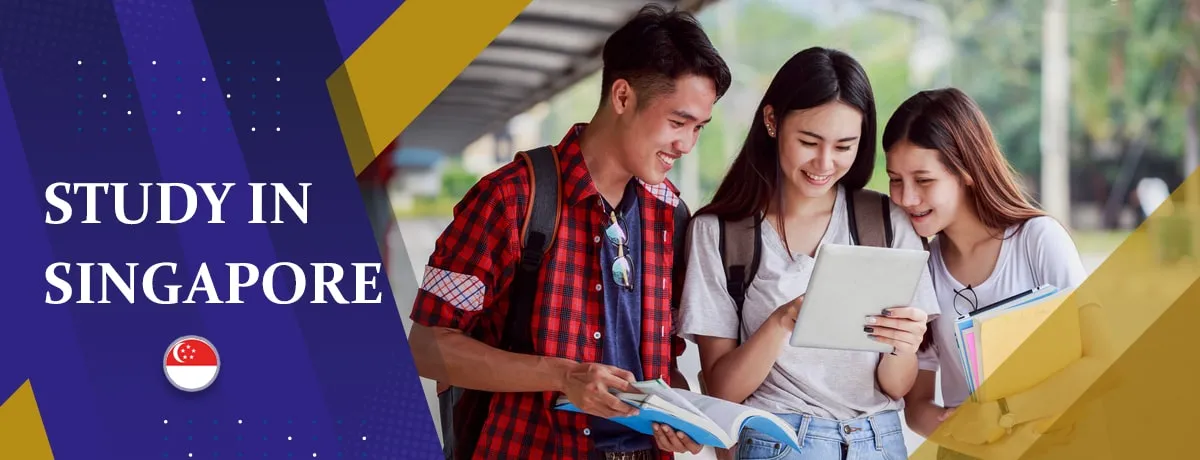Contact Information
Study in Singapore

Singapore, is a sovereign city-state and island country in Southeast Asia. The country's territory consists of the lozenge-shaped main island, commonly referred to as Singapore Island in English and Pulau Ujong in Malay, and more than 60 significantly smaller islets.
Singapore is one of the world's major commercial hubs, with the fourth-biggest financial centre and one of the five busiest ports. Its globalised and diversified economy depends heavily on trade, especially manufacturing, which represented 26 percent of Singapore's GDP in 2005. In terms of purchasing power parity, Singapore has the third-highest per capita income in the world but one of the world's highest income inequalities. It places highly in international rankings with regard to education, healthcare, and economic competitiveness. Just over five million people live in Singapore, of which approximately two million are foreign-born. While Singapore is diverse, ethnic Asians predominate: 75 percent of the population is Chinese, with significant minorities of Malays, Indians, and Eurasians. There are four official languages, English, Malay, Mandarin, and Tamil, and the country promotes multiculturalism through a range of official policies.
Singapore is a modern city state with excellent opportunities for education and work. Many global reports show that Singapore is one of the world’s leaders in innovation and research, which in turn makes its institutions of higher education attractive locations for all prospective international students.
Education takes place in three stages: primary, secondary, and pre-university education. Only the primary level is compulsory. Students begin with six years of primary school, which is made up of a four-year foundation course and a two-year orientation stage. The curriculum is focused on the development of English, the mother tongue, mathematics, and science. Secondary school lasts from four to five years, and is divided between Special, Express, Normal (Academic), and Normal (Technical) streams in each school, depending on a student's ability level. The basic coursework breakdown is the same as in the primary level, although classes are much more specialised. Pre-university education takes place over two to three years at senior schools, mostly called Junior Colleges.
Undergraduate:The Private Institutes offer bachelors degree programmes in almost every subject. The duration of the bachelors course is 3 years to 4 years. The admission requirements vary from programme to programme. The SAT, TOEFL and IELTS are not compulsory for admission. The students completed their 12th or 11th Std. or equivalent to Singapore A level can apply for the bachelor degree in Private institutes.
Postgraduate:Master degree programmes are primarily designed to prepare students for practice of profession.The duration of graduate courses may range from one year to two years depending upon the university. The various Master degree are MA, MS, MBA, MFA etc. Generally, an applicant must have atleast a good bachelors degree and two years work experience. In addition, an applicant whose native language or medium of instruction for the bachelors degree is not english must have a good TOEFL score or IELTS score. Applicant applying for admission in engineering, computer science, science should also preferably have good GRE scores. Those applying for business-related courses should have obtained either GRE or GMAT scores.
Intakes:Main Courses by Government University - August/February
Polytechnics - April/September
Private Education Organisation - Jan/ Feb/July/Aug/Sep/Oct/etc
Requirements:Language Requirements:
| Course |
IELTS |
TOEFL |
| Under Graduate |
6.5 |
80 |
| Post Graduate |
7.5 |
90 |
Education and living costs
Living Costs
Singapore Government awards scholarships to government endorsed students from member countries of ASEAN. Scholarships are available for undergraduate courses at NUS, NTU and SMU on the basis of academic merit and are available through open competition. Besides Medicine and Dentistry, all disciplines are open for scholarship. The scholarship will be available for all the 3-4 years of the course. In addition, a one-year bridging or foundation programme will be provided if necessary.
EligibilityImmigration & Checkpoints Authority (ICA) form 16 & Form V36 After receiving the offer letter from the desired institute for particular course, students need to apply for student pass to enter Singapore. Institutes in Singapore will file the Singapore student pass for Indian application behalf of students to Singapore immigration and check point authority (ICA). Singapore student pass application Fee varies from institute to institute. Normally it will take 2 - 3 weeks to get the Singapore student visa passes. The details provided in this page are suitable for Singapore visa for Indian citizen. Singapore student visa for Indian is applied by the institutes in Singapore.
Proof of Financial SourcesAs per the Singapore student visa rules, candidate has to show funds which must be minimum 1 day old from date of visa application.
If the funds are as fixed deposit then, bank must issue a letter confirming the availability of same. Bank letter must be dated less than 30 days from the date of visa application.
Singapore student pass requirements for Indian in same order as given hereunder:
Applicants are encouraged to submit application at least 2 months before the commencement of the course.
If the required documents are not in the English language, officially translated versions as well as copies in the originally language are required.
 For
Polytechnic Courses – Xth/XIIth Pass from Indian School
For
Polytechnic Courses – Xth/XIIth Pass from Indian School